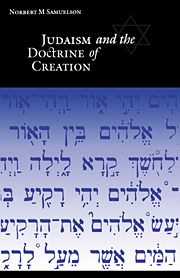Book contents
- Frontmatter
- Contents
- Preface
- Introduction
- PART 1 THE MODERN DOGMA OF CREATION
- Chapter 1 Creation in Franz Rosenzweig's Star of Redemption
- Chapter 2 A critique of Rosenzweig's doctrine: is it Jewish and is it believable?
- PART 2 A JEWISH VIEW OF CREATION
- PART 3 THE FOUNDATIONS FOR THE JEWISH VIEW OF CREATION
- PART 4 A BELIEVABLE VIEW OF CREATION
- Notes
- Select bibliography
- Indices
Chapter 1 - Creation in Franz Rosenzweig's Star of Redemption
Published online by Cambridge University Press: 08 January 2010
- Frontmatter
- Contents
- Preface
- Introduction
- PART 1 THE MODERN DOGMA OF CREATION
- Chapter 1 Creation in Franz Rosenzweig's Star of Redemption
- Chapter 2 A critique of Rosenzweig's doctrine: is it Jewish and is it believable?
- PART 2 A JEWISH VIEW OF CREATION
- PART 3 THE FOUNDATIONS FOR THE JEWISH VIEW OF CREATION
- PART 4 A BELIEVABLE VIEW OF CREATION
- Notes
- Select bibliography
- Indices
Summary
The fact that creation plays a major role in Rosenzweig's philosophy is itself an indication of the Jewishness of his thought. No philosophical topic, including God's unity, was more fundamental to traditional Judaism than the question of the creation of the universe. Only one pre-modern Jewish thinker, viz., Abraham Ibn Daud (1110–1180), did not discuss it, but none denied it. Furthermore, everyone who ranked Jewish beliefs by any criteria made creation fundamental. The first of Moses Maimonides' (1135–1204) thirteen root principles of Judaism speaks of the existence of “the creator” and he later claimed that his fourth principle, that God is eternal, entails that God created the universe. Simon Ben Zemach Duran (1361–1444) made creation the single most important principle, from which everything else follows. Bibago made it one of his only two basic principles. Finally both Chasdai Crescas (d. 1412) and his student Joseph Albo (lived between 1380 and 1440) relegated it to a lesser rank than Duran and Bibago, but, nonetheless, it remained for them as well a basic principle of Judaism.
Nevertheless, Rosenzweig is atypical as a modern Jewish thinker in placing such strong emphasis on creation. In fact, given the centrality of the concept in classical Jewish philosophy, that Rosenzweig is exceptional in this respect is surprising. The topics that most concerned Baruch Spinoza (1632–1677) were the nature and existence of God, ethics, divine providence, and the status of the Torah as divine revelation.
- Type
- Chapter
- Information
- Judaism and the Doctrine of Creation , pp. 29 - 67Publisher: Cambridge University PressPrint publication year: 1994



